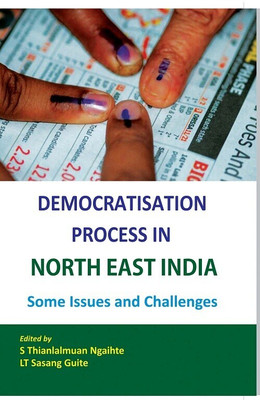Democratisation Process in North East India -Some Issues and Challenges(Paperback, S Thianlalmuan Ngaithe, Lt Sasang Guite)
Quick Overview
Product Price Comparison
About The Author: S Thianlalmuan Ngaihte primarily works and writes on issues related to North East India. He cleared UGCNET in Political Science. He has worked on the role of ethnic elite in the construction and (trans)formation of community identity through a case study of Paite community of Manipur, for his doctoral thesis. He has authored Elite, Identity and Politics in Manipur (2013), and wrote articles which are published in Economic and Political Weekly, International Journal of South Asian Studies, Journal of NorthEast India Studies and Man and Society. His areas of interests are ethnicity and identity politics, NorthEast India studies, conflict and peace studies, globalisation, human rights, and government and politics. L T S as an g Guite is presently pursuing PhD in the Department of Geography, Northeastern Hill University, Shillong. The focus of his research work is on ethnic conflict over space and its geographical implications with reference to the Hill areas of Assam. He passed UGCNET in 2006. He worked as Lecturer in St. Peter's College, Shillong. To his credit, he has published one article in national and two in international journals. 23 Contents: Foreword 11 Preface 13 List of Contributors 17 SECTIONŌĆōI: PRELUDE 1. Democratisation: Preliminary Reading 21 Can There ever be Absolute DemocratisationŌĆöSome Select Challenges to Democratisation ProcessŌĆöDemocratising Gender EqualityŌĆöTradition Versus Democratic PrinciplesŌĆöEthnopolitical AspirationsŌĆöDemocratisation Process and Civil SocietyŌĆöConclusion. S. Thianlalmuan Ngaihte 2. Thought on Challenges of Democratisation among Tribals of NorthEast India 31 Toki Blah SECTIONŌĆōII: GENDER ISSUES 3. An Anthropological Perspective on Gender 39 Gender: A Conceptual DiscussionŌĆöContribution of Anthropological Studies to GenderŌĆöObservationŌĆö Conclusion. Lucy T.V. Zehol 4. Gender Equality among the Zomis 51 IntroductionŌĆöWho are the Zomis?ŌĆöLet us See if Gender Equality or Inequalities Exist in the Zomi SocietyŌĆöThe Status o


